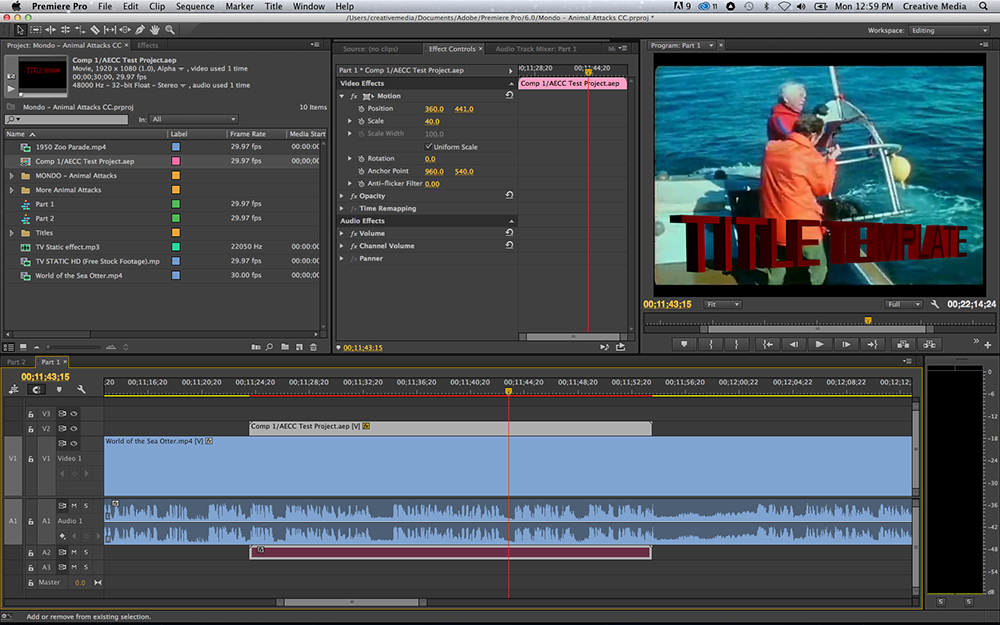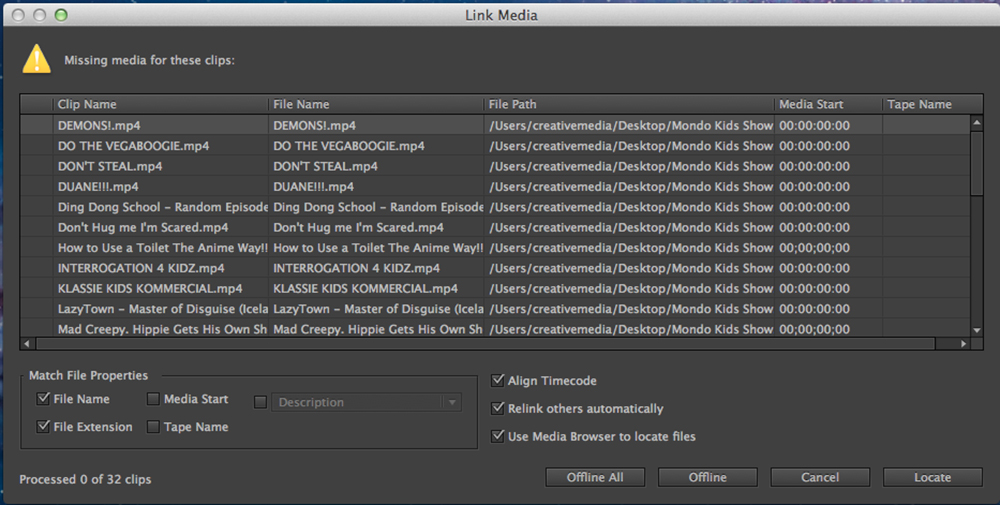Premiere Pro CC
 Publisher: Adobe
Publisher: AdobePlatforms: PC & Mac
Description: Video Editing Software
MSRP: Pricing Plans Available Here
Expected Release: Available Now
Official Website: http://www.adobe.com
Samples: Click Here
Demo: Click Here
Special Discount: N/A
Review Issue: Issue #90 (8/13)
Review By: Mark Colegrove
Final Score: 8.8
Recently, Adobe launched the latest version of Premiere Pro, now called “Premiere Pro CC,” for “Premiere Pro Creative Cloud.” While the new features and improvements aren’t radically different from Premiere Pro CS6 (the previous edition), the method of purchasing is. In case you haven’t heard, from here on out, to stay current with any Adobe software you will need to purchase a subscription to their Creative Cloud service… more on that later.
Ease of Use
For new users, Premiere Pro is a professional level video editing program that will take some time to learn. Doing some tutorials online or buying a book with some exercises you can go through is my recommendation.

The default layout of Premiere Pro gives you your timeline, project bins, and source and program monitors.
As a longtime Premiere Pro user, the first thing I noticed is that there’s been somewhat of an overhaul to the look of your timeline, which goes well beyond what you’d typically see in a “.5” upgrade, although the timing of this release is just a little over one year past when we first saw Premiere Pro CS6. Ultimately a couple of the new features immediately make the program easier to use, while a few left me scratching my head.

It’s probably best to play around with and get used to the new timeline look before cutting your first project.
For example, borrowing from audio programs like their own Audition software, we now have a solo button right there on each track, while the mute button has been replaced with a big M. Also similar to Audition, if I hold down shift and jog the wheel on my mouse, all the tracks expand or collapse. That’s cool. No more need to manually expand each track when you get into fine audio adjustments. Furthermore, our waveforms are now bigger and easier to see (although for some reason the colors they picked to represent the waveform are reversed from what was used in the previous edition, and for me are not as immediately intuitive).
On the other hand, what is going on with transitions?! Instead of the conveniently skinny transition bar from CS6, we now have a big ol’ fat transition that takes up the whole size of our clip. We used to be able to drag each end independently… now you have to hold in shift to do so. Formerly, if I double clicked on an applied transition, the effects window would automatically open to adjust its properties. Now we have to first click the transition, and then manually open the effects window. Seriously, what gives here?!? None of these things are better.
Depth of Options
Premiere Pro has always been great at working with new formats natively (i.e. no converting your DSLR files into Quicktime before editing), and the integration with After Effects is a big plus. Ever since CS2, you’ve been able to easily take your work from Premiere into After Effects, and back again, which is great for those doing a fair amount of animated graphics. I often find that I’ll have After Effects open on one monitor and Premiere Pro on the other so I can drag project files in on the fly to ultimately render out in Premiere Pro.

The round tripping between Premiere Pro and After Effects has always been what’s made Premiere Pro my editing program of choice.
With CS6 we saw the dawn of Speedgrade, an associated Adobe program for high-end color correction. Formerly, there wasn’t much round-tripping possible (like there was with After Effects), so you would want to wait until you had picture lock before even beginning to color correct in Speedgrade. Now, in Premiere Pro CC, you have the option to apply Lumetri looks (which you can customize and save in Speedgrade) right inside of Premiere. You even get a handy little icon that shows you roughly what it will look like.
Performance
Over the years, I’ve come to be able to work very fast in Premiere Pro, primarily due to the fact that it’s designed with shortcuts in mind. Premiere Pro CC has added a couple key features to make things even quicker.
In the already excellent multicam mode, we now have the ability to sync clips using only audio as the source of sync. I’ve been using PluralEyes for a couple years now to accomplish this exact same task and it’s nice that it’s built right into the program now. This is ideal for anyone covering live events or syncing up audio from a separate source.
Ever get that obnoxious “Media Offline” graphic? Yeah, me too. Another new feature that shouldn’t be overlooked is the new “link and locate” window, which will intelligently find files in your project. While I found this feature to function fairly well before, this new option is definitely slicker, tying in with the Media Browser. as well. to give you a thumbnail of your clip.
Value
The move to the Creative Cloud has already been met with a fair amount of debate. On the plus side, you’ll always have the latest version of every program in the Adobe Creative Suite, with updates set to be released more frequently as opposed to a set schedule. At $50 per month, it’s also more immediately affordable–“immediately,” of course, being the operative word.
The cons? Well who REALLY needs every program in the Creative Suite? As a video professional, I think I’ve only opened Adobe Fireworks once by accident.
Assuming you ONLY want Premiere Pro CC, you’re just looking at $10 per month, but to really take advantage of what you can do with Premiere Pro CC, you’d want After Effects, Audition, Prelude & Speedgrade as well.
So what’s clearly missing from the Creative Cloud offerings is a mid-level offering: the equivalent of the “Production Premium” bundle previously offered, which included just the video-oriented tools from the Creative Suite. If Adobe were to offer that for say, $30 per month, I believe the move to the Cloud would be a no-brainer for most freelancers and indie filmmakers.
Final Thoughts
The move away from the traditional license to subscription is jarring for a lot of people, myself included. It’s ignited a debate that’s somewhat reminiscent of Apple’s launch of Final Cut Pro X a couple years ago.
While the new features are pretty great overall, it’s not enough to make me want to immediately put down Premiere Pro CS6 and get a Creative Cloud subscription.
There will, however, be a day where CS6 IS obsolete, and a one time fee of $300 for a piece of editing software may be a bit more palatable for editors than $600 per year for the rest of their days on this Earth.
Premiere Pro is my favorite editing program by a long shot. Adobe really knows how to make a product that speaks to professionals. Hopefully they can iron out some of the kinks of their Creative Cloud program and cater more to specific groups of people, like they did before.
|
Breakdown
|
|
|
Ease of Use
|
9 |
|
Depth of Options
|
10 |
|
Performance
|
10 |
|
Value vs. Cost
|
6 |
|
Overall Score |
8.8 |




